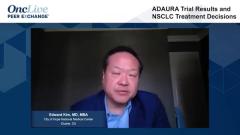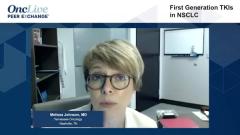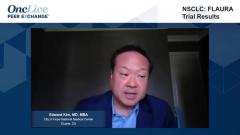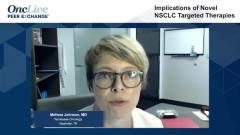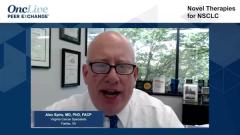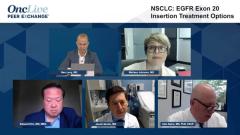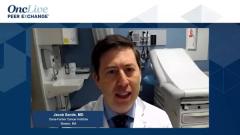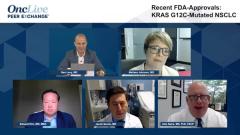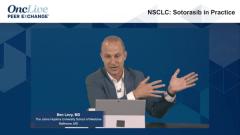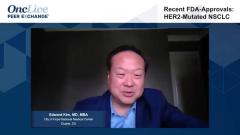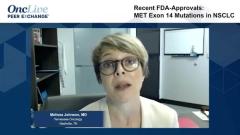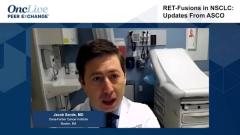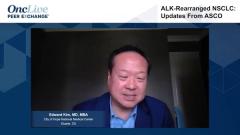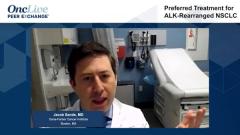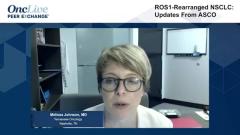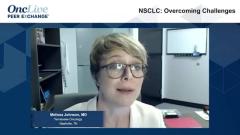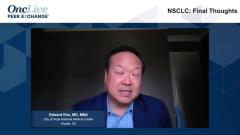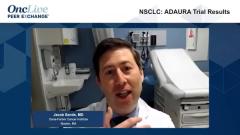
ASCO 2021: New Data for NSCLC Treatment Options
Jacob Sands, MD, reviews data regarding the investigational oral EGFR inhibitor DZD9008 that were presented at the American Society of Clinical Oncology (ASCO) 2021 annual meeting for the treatment of non–small cell lung cancer (NSCLC).
Episodes in this series

Ben Levy, MD: Melissa, you mentioned multiple drugs coming down the pike, and you went over a lot of them. Jacob, we had another drug presented at ASCO [the American Society of Clinical Oncology annual meeting], DZD9008, an irreversible EGFR drug. Do you want to walk us through? These data kind of went under the radar initially, but looking at it more it looks very impressive, and we’ll have to see how things shake out. But do you want to walk us through it quickly?
Jacob Sands, MD: It might have gone under the radar a bit just because it’s still early, although the data are nice to see. Essentially you have safety data and efficacy data; it went through the phase 1 starting at 50 mg, but ultimately expansion at 200 and 300 mg, particularly. There were more data with the 300-mg group. About half of patients had gotten a prior EGFR TKI [tyrosine kinase inhibitor]. Generally, it was well tolerated.
At the 300-mg dose, there were dose reductions in about 12% of patients. There were some toxicities. But when you look at the [adverse] effect profile, most of these are not necessarily patient experience kind of toxicities. Things like what you see on laboratory reports; diarrhea was noted. About 5% of patients did have a greater than or equal to grade 3 diarrhea.
Some of what we have seen with prior TKIs were noted. But as mentioned, the waterfall plot looked strikingly good in this, as we do see with a lot of different targeted therapies. And to see that in patients who had gotten prior treatments, including targeted therapy treatments, was impressive, particularly in a setting where we are just starting to see some real successes. That’s something to watch going forward, but there is still more study to do. The median duration of response was greater than 8-1/2 months. But overall, there are a lot of ongoing responses and efficacy data that need to mature.
Ben Levy, MD: It’s impressive now to have 4 potential drugs. One approved, amivantamab, and then we’ve got mobocertinib, poziotinib, and now DZD9008, a crowded market, and we’ll see what happens. Alex, how do you treat a patient with an EGFR exon 20 [mutation] today? You have amivantamab post-chemotherapy. What’s your chemotherapy de jour for a patient with exon 20, or do you use something else?
Alex Spira, MD, PhD, FACP: Right now with the approvals it’s still going to be chemotherapy first because AMI [amivantamab] is approved in the second line, so I think it’s CARBO/PEM [carboplatin, pemetrexed]. There’s still going to be the ongoing debate as we had with osimertinib, do you give a checkpoint inhibitor or not. I don’t because I firmly believe that the data carry across, although I know others may argue with me. But I give CARBO/PEM [carboplatin, pemetrexed], and that’s what most of my colleagues who I talk to will do.
There’s an ongoing study of chemotherapy vs chemotherapy plus AMI [amivantamab] in the frontline setting, and I’m certain there are going to be a lot of questions. Do you give off-label use of AMI [amivantamab]? There’s something inherently exciting about having a target, right? This is what we strive for as oncologists. You have a target, you should treat. In my opinion, the response rates in the second- or third-line setting were not quite good enough to justify it being better than chemotherapy. Although, patients may not want to do chemotherapy just because it’s called chemotherapy. But for me it’s CARBO/PEM [carboplatin, pemetrexed] first line, the study, if you have it. Then the second-line treatment with an exon 20 drug, whatever is approved. I think MOBO [mobocertinib] will be approved pretty soon as well.
Ben Levy, MD: Ed, would you consider using AMI [amivantamab] first line for a patient with exon 20 if you had it, or do you still think that’s reserved for the second line?
Edward Kim, MD, MBA: I would consider using it first line. You can always use chemotherapy afterward. That’s not consistent with the data obviously in the trial that they’ve done. But again, we looked at the same discussion. Maybe it’s a person who’s a little more beat up. I know it’s pretty easy to give chemotherapy. We don’t know what the effect of IO [immunotherapy] does in any of this, so I would be tempted to do that, yes.
TRANSCRIPT EDITED OR CLARITY


